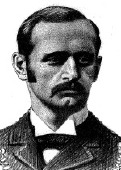
Prescott Jernegan claimed he had found a way to cheaply extract gold from sea water. His "Gold Accumulator" consisted of a wooden box, inside of which was a pan of mercury mixed with a secret ingredient. A wire connected the mercury to a small battery. When lowered into the ocean, this contraption supposedly sucked gold out of the water.
A test conducted in Narragansett Bay in February 1897 proved the gold accumulator worked. After a few hours the box was raised, full of gold flakes.
Soon Jernegan had found investors who helped him found the Electrolytic Marine Salts Company. When the company offered stock, the share price rapidly rose from $33 to $150. But to the dismay of investors, the apparent success of the gold accumulator was entirely due to the diving skills of Jernegan's accomplice, Charles Fisher. Fisher would swim underwater in a diving suit and salt the mercury with gold.
Jernegan and Fisher fled to France in July, 1898 with over $200,000 before the scam was found out.
More…

 Prescott Jernegan claimed he had found a way to cheaply extract gold from sea water. His "Gold Accumulator" consisted of a wooden box, inside of which was a pan of mercury mixed with a secret ingredient. A wire connected the mercury to a small battery. When lowered into the ocean, this contraption supposedly sucked gold out of the water.
Prescott Jernegan claimed he had found a way to cheaply extract gold from sea water. His "Gold Accumulator" consisted of a wooden box, inside of which was a pan of mercury mixed with a secret ingredient. A wire connected the mercury to a small battery. When lowered into the ocean, this contraption supposedly sucked gold out of the water.
Chemistry Hoaxes